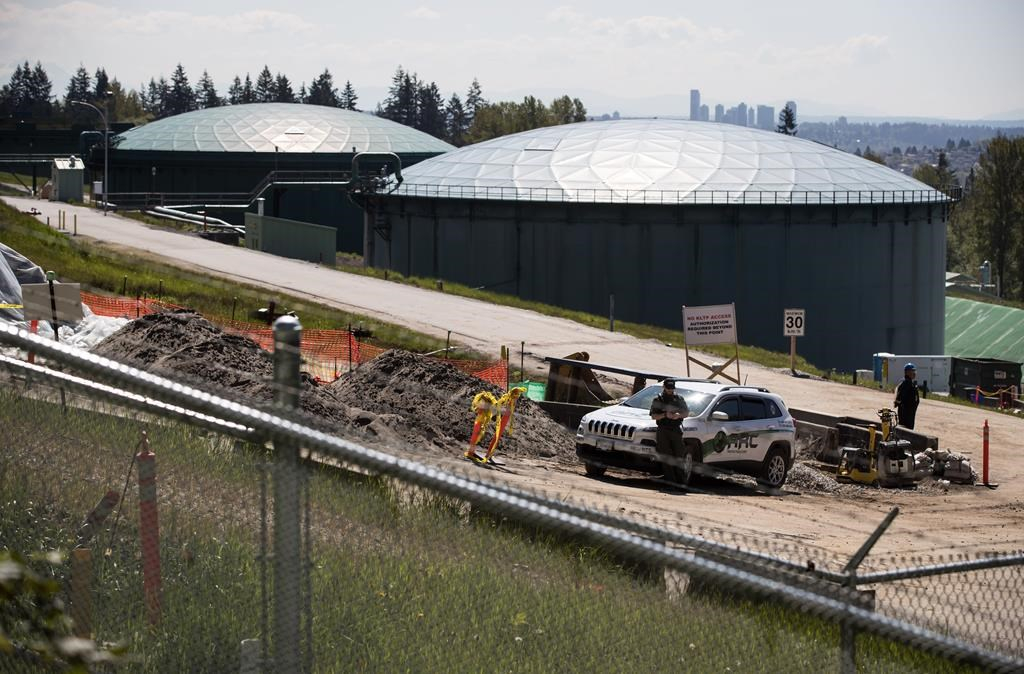Support strong Canadian climate journalism for 2025
A court has ruled that British Columbia cannot restrict oil shipments through its borders in a decision that marks a win for the Trans Mountain pipeline expansion and Alberta's efforts to get its resources to overseas markets.
The province filed a constitutional reference question to the B.C. Court of Appeal that asked whether it had the authority to create a permitting regime for companies that wished to increase their flow of diluted bitumen.
A five-judge panel agreed unanimously that the amendments to B.C.'s Environmental Management Act were not constitutional because they would interfere with the federal government's exclusive jurisdiction over interprovincial pipelines.
Justice Mary Newbury wrote on behalf of the panel that the substance of the proposed amendments were to place conditions on and, if necessary, prohibit the movement of heavy oil through a federal undertaking.
Newbury also wrote that the legislation is not just an environmental law of "general application," but is targeted at one substance, heavy oil, in one interprovincial pipeline: the Trans Mountain expansion project.
"Immediately upon coming into force, it would prohibit the operation of the expanded Trans Mountain pipeline in the province until such time as a provincially appointed official decided otherwise," she said.
"This alone threatens to usurp the role of the (National Energy Board), which has made many rulings and imposed many conditions to be complied with by Trans Mountain for the protection of the environment."
B.C. argued that the proposed amendments were meant to protect its environment from a hazardous substance, while the federal government and Alberta said the goal was to block Trans Mountain.
Newbury wrote that even if the legislation was not intended to single out the expansion project, it has the potential to affect — and indeed "stop in its tracks" — the entire operation of Trans Mountain as a carrier and exporter of oil.
She said the National Energy Board is the body entrusted with regulating the flow of energy resources across Canada to export markets, and it has already imposed many conditions on Trans Mountain.
She added that the expansion is not just a British Columbia project because it affects the whole country.
The proposed amendments would have meant that Trans Mountain Corp., and any other company wishing to increase the amount of heavy oil it transported through B.C., would have had to apply for a "hazardous substance permit."
The permit application would have had to detail the risks to human health and the environment from a spill, plans to mitigate those risks and financial measures, including insurance, that ensured payment of cleanup costs.
A provincial public servant would have had the authority to impose conditions on a hazardous substance permit and cancel or suspend the permit if the company did not comply.
B.C. announced the legislative amendments in January 2018, sparking a trade war with then-Alberta Premier Rachel Notley, who retaliated with a ban on B.C. wines in her province.
Premier John Horgan eased the tension by promising to file a reference case asking the Appeal Court whether the amendments were constitutional, prompting Notley to suspend the wine ban in February 2018.
Prime Minister Justin Trudeau's government has purchased the Trans Mountain pipeline and expansion project for $4.5 billion. Construction was paused last August after the Federal Court of Appeal overturned the federal permits.
The project would triple the pipeline's capacity to carry diluted bitumen from the Edmonton area to Metro Vancouver, and increase the number of tankers in Burrard Inlet seven-fold.





Comments
It strikes me that all these constitutional laws and precedents were established long before there was an understanding of the existential threat of climate change resulting from fossil fuel consumption. Even now, while those who have an expert knowledge of climate science warn us that we are moving toward our own extinction, as well as mass extinctions in our natural world, our politicians are indulging in denial or ignorance of the facts, or in mischaracterization of facts and evidence as being somehow partisan, even "left".
We've seen evidence that our NEB is industry-captured, and yet this Court decision defers to the NEB, as though it were incorruptible and broadly representative. We've heard that our politicians are massively lobbied by the fossil fuel industry. We know the fossil fuel industry has donated massively to political parties. Politicians like Jason Kenney are even going out of their way to finance a propaganda campaign, openly, against citizens represented by charitable and non-profit groups, and media groups and personnel, so that there is limited chance of voting Canadians learning about and understanding the crisis we are galloping toward. Mr Kenney hasn't asked the young people of his province whether they'd prefer short-term wealth over the diminishing prospects of their own security and survival. Clearly Mr Kenney is one of the most industry-captured citizens in Canada, and has been handed inappropriate levels of influence by our very flawed electoral system.
I would like to know what adaptations our Courts and judiciary have made or are pursuing, to ensure that they too, not just governments and citizens, are acting appropriately urgently and informedly, on the IPCC reports. Climate change should be front and centre in every decision that is made around resource extraction and the energy industry. If a 16 year old autistic Swedish schoolgirl, and now millions of children worldwide, whose futures are at stake, can clearly see the need for drastic emergency action to ensure our future, why can't our courts, governments, industries, and media industry do the same? Do they have no sense of responsibility, and no ability to adapt their thinking and processes? Do they not notice the massive baked-in bias toward profits over lives, which seems to constitute their idea of precedent?
The people who applaud this decision don't take into account any of the concerns that you mentioned in your post. I have commenting back and forth on Facebook with loved ones and others on this issue and it is clear that economic matters have more importance than environmental issues. I can assure that if oil was able to leak out into the Bow River, King Jason would reverse his decisions and be the premier that really wants to protect Albertans from environmental crimes. This whole thing just makes me sick!!!!
Well put!
This year so far there has been one tanker a month loading at the Westridge terminal, so the increase would be a factor of about thirty.